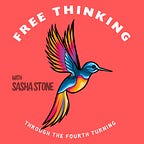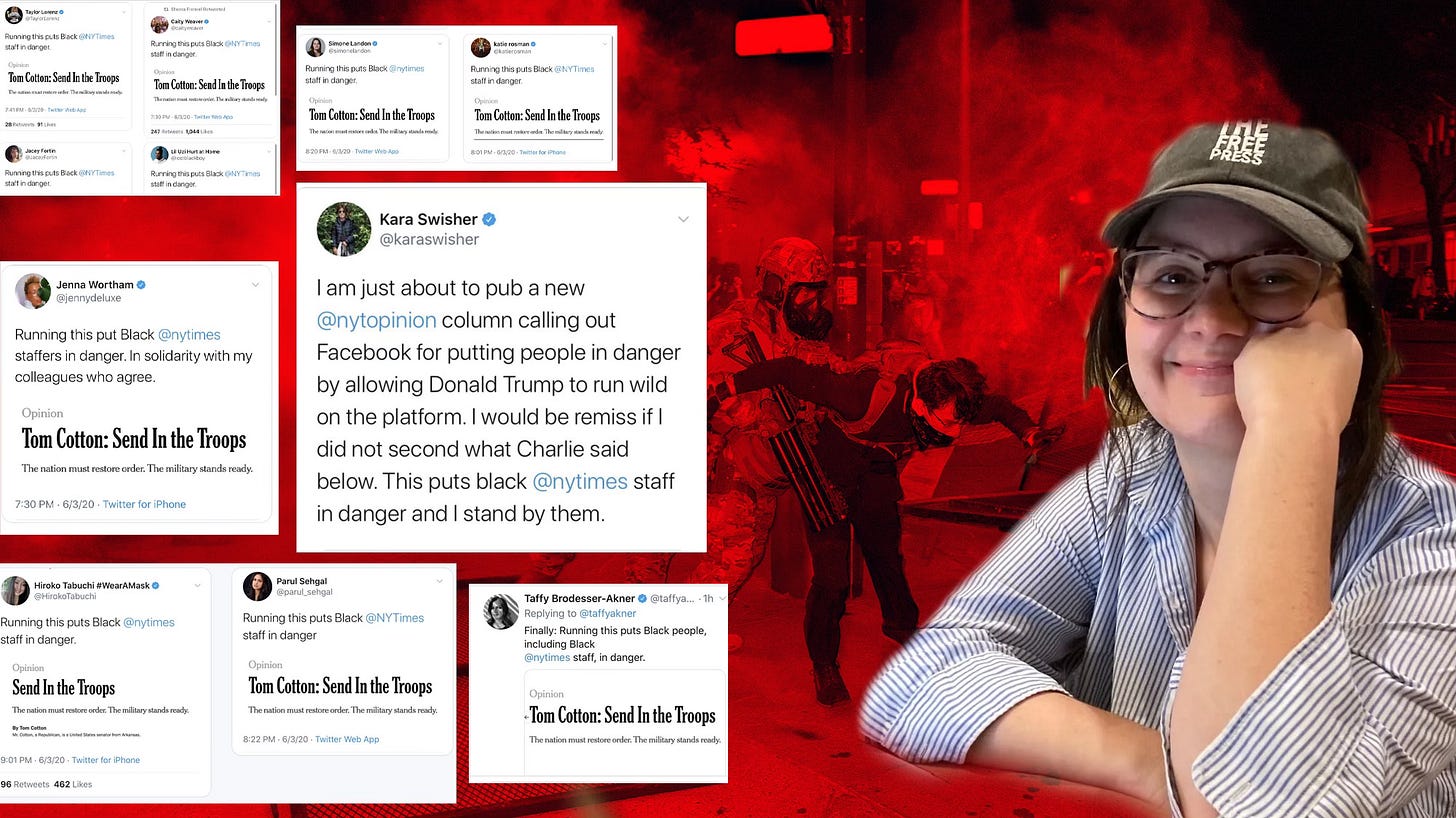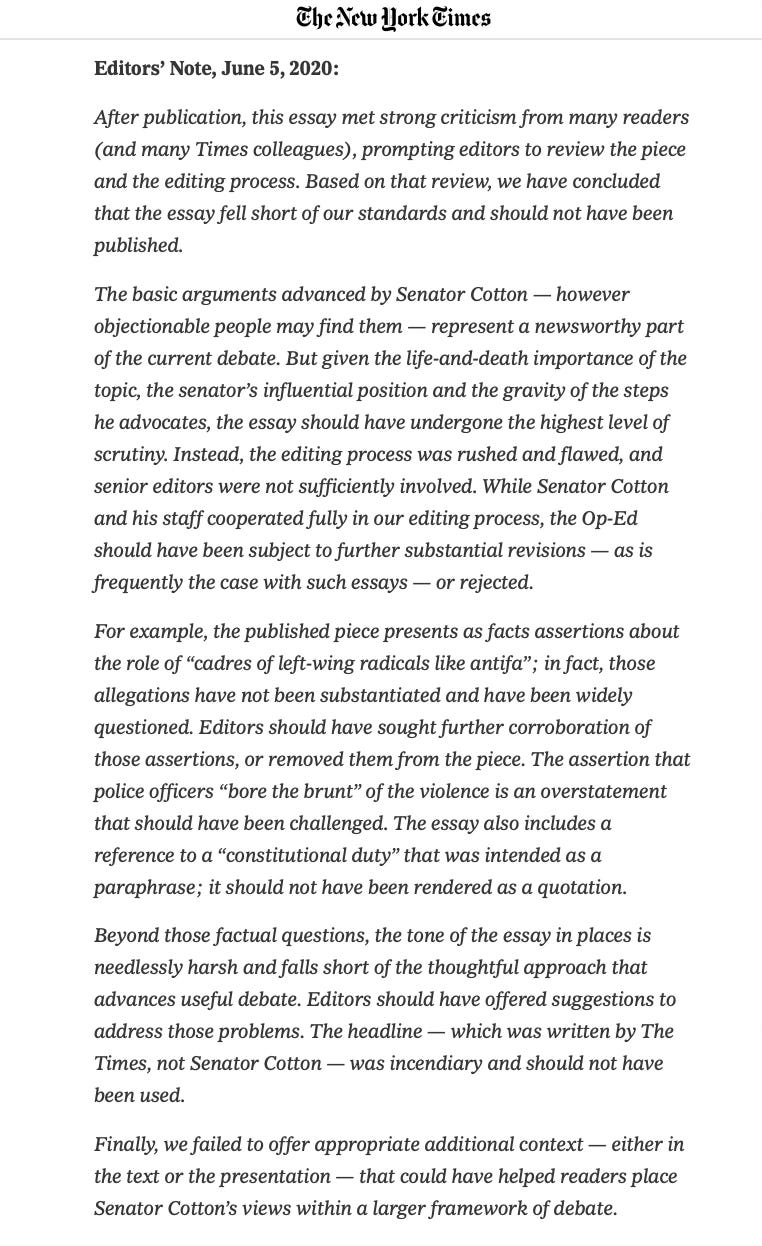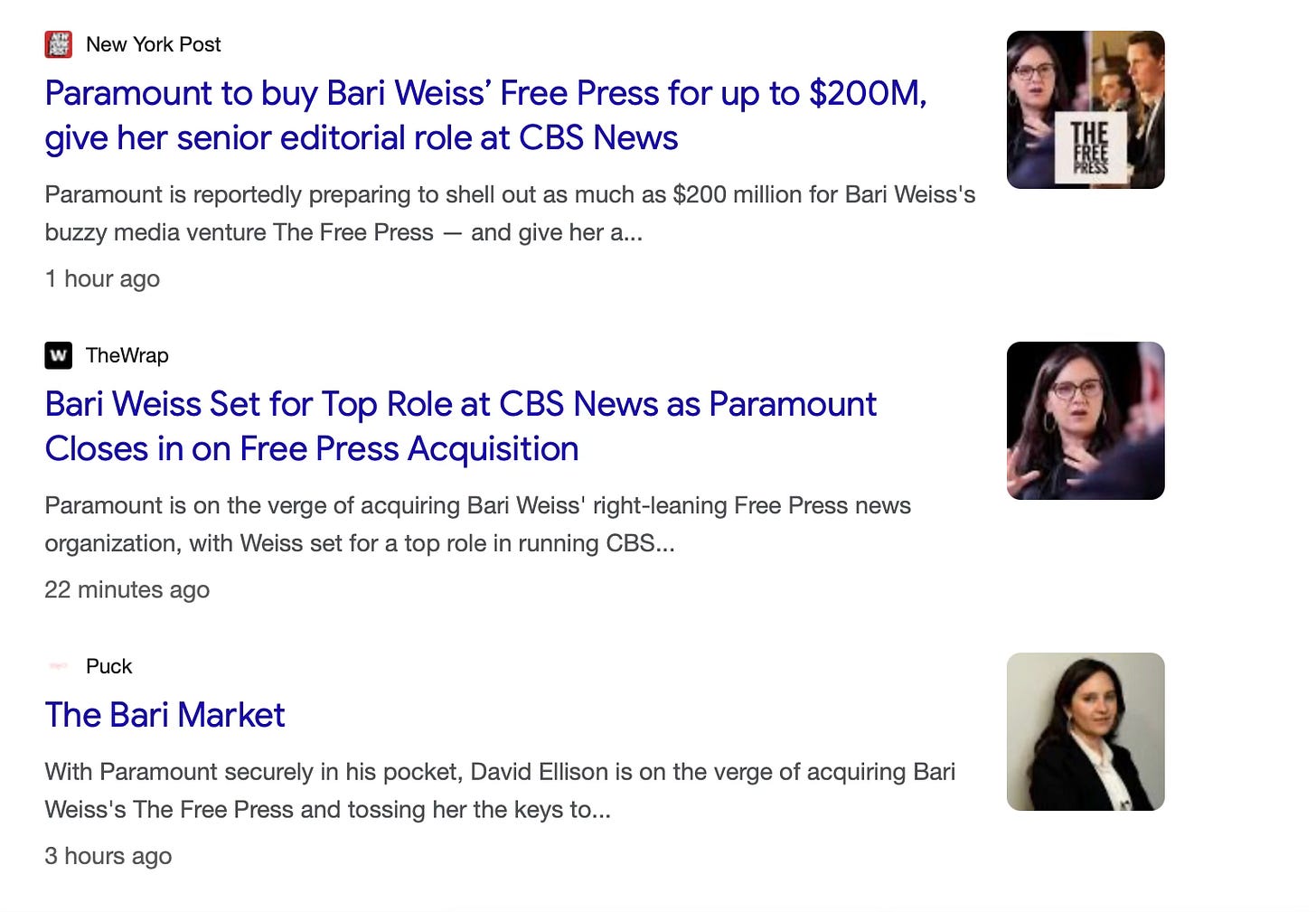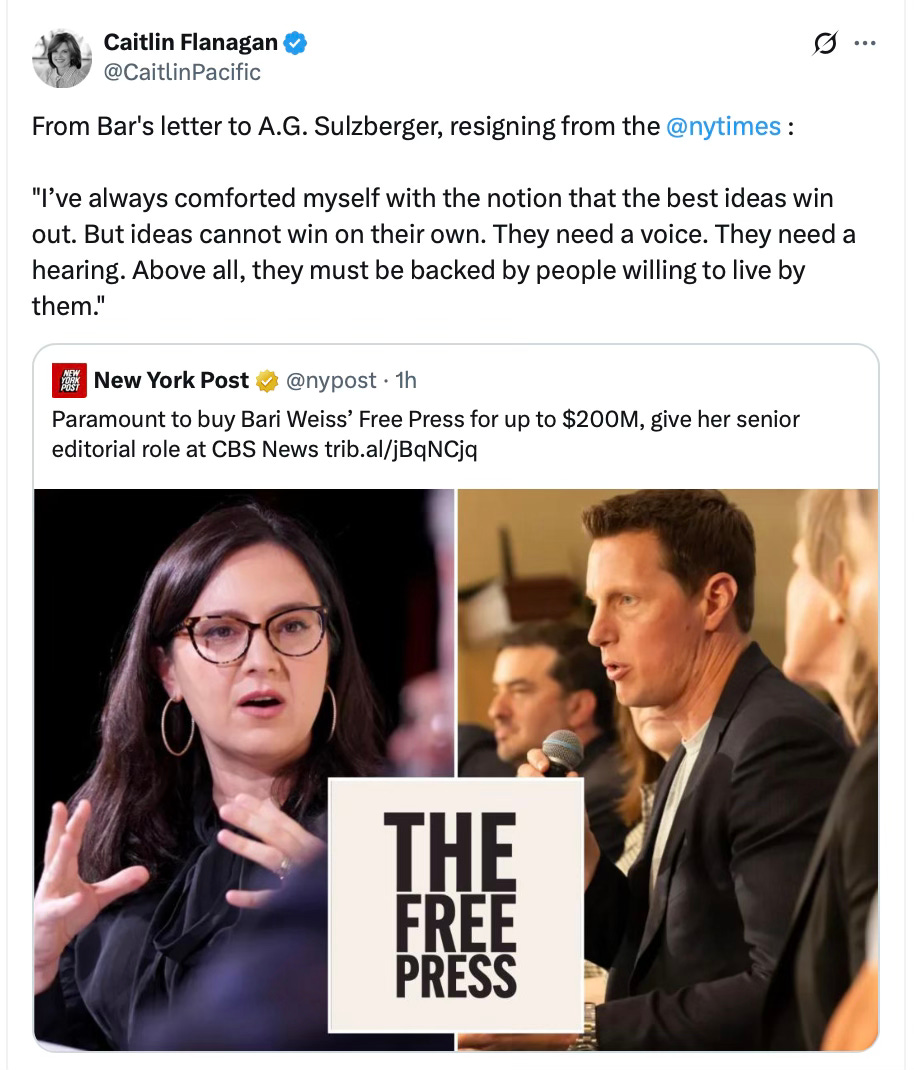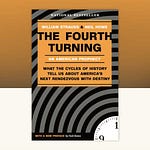Everything changed for me in early June of 2020, when the Tom Cotton essay appeared in the New York Times and all hell broke loose on Twitter.
I was scrolling the app to my detriment, as I always do, and all of a sudden, it was like the night Donald Trump won the election. Big trouble in blue-check city.
The New York Times published an op-ed that called for the military to be brought in if the riots could not be controlled. Even typing that sentence, calling them “riots” instead of protests, was a thought crime and could not be said out loud, so you can only imagine how horrifying it was for the reality deniers on Team Fragility to hear Cotton’s thesis statement, “This week, rioters have plunged many American cities into anarchy, recalling the widespread violence of the 1960s.”
It was dangerous because it was the truth. Like this scene in The Insider, where Jeffrey Wigand’s story has to be buried because it might disrupt a corporate merger at CBS News, except this time it might upset the Times staffers and the Twitter hive mind.
The point was, Cotton was not only telling the truth — a truth all of us could see with our own eyes — but he was reflecting the majority opinion of Americans. That’s why Bari Weiss and James Bennett asked Tom Cotton in the first place to represent the other half of America that the New York Times and everything under the Left’s control abandoned.
I sat in my apartment, gobsmacked that all of this was playing out. Here we’d spent months on lockdown, making our own hand sanitizers and masks. My daughter was sent home from her senior year of college to have her graduation on my balcony. And all of a sudden, none of that mattered because “systemic racism” mattered more. Yeah, that’s what the experts told us.
All of these years later, after everything we’ve seen and learned about that time in our history, we know the Democrats needed it to be bad — bad enough to pressure Americans into voting out a one-term president with a strong economy. It’s just that I didn’t know that then. All I knew was that no one would talk about it. If you did, your career would be over.
The Tom Cotton op-ed would change the course of my life forever because that was the moment I could suddenly see that I wasn’t getting the truth. I was getting the negotiated truth, the narrative, what they wanted me to know. I began to wonder, what else wasn’t true?
It was also the moment everything changed for Bari Weiss, who’d been hired to shake up the media bias at the New York Times.
Everyone I knew on Twitter swarmed her, attacked her, and attacked the Times the day the op-ed was published. They were dragging out the history of James Bennett. They were accusing the Times of “putting Black bodies in danger.” The staff felt unsafe, and before long, Bari Weiss became the problem.
They kept the piece up but affixed an embarrassing disclaimer at the top, which is still there:
After that, Bari Weiss didn’t just resign. She took a flamethrower to the Times in a fiery resignation letter that was the shot heard round the world, or at least the internet. She wrote:
But the lessons that ought to have followed the election—lessons about the importance of understanding other Americans, the necessity of resisting tribalism, and the centrality of the free exchange of ideas to a democratic society—have not been learned. Instead, a new consensus has emerged in the press, but perhaps especially at this paper: that truth isn’t a process of collective discovery, but an orthodoxy already known to an enlightened few whose job is to inform everyone else.
Twitter is not on the masthead of The New York Times. But Twitter has become its ultimate editor. As the ethics and mores of that platform have become those of the paper, the paper itself has increasingly become a kind of performance space. Stories are chosen and told in a way to satisfy the narrowest of audiences, rather than to allow a curious public to read about the world and then draw their own conclusions. I was always taught that journalists were charged with writing the first rough draft of history. Now, history itself is one more ephemeral thing molded to fit the needs of a predetermined narrative.
They thought that was the end of Bari Weiss. They’d chewed her up and spit her out. Boy, were they wrong. It is now one of the greatest success stories ever told, almost on par with Donald Trump defeating the machine and winning again.
According to Puck News, Bari Weiss and the Free Press have now been offered a deal upwards of $200 million to sell the site to Paramount/Skydance and put Bari Weiss in charge of guiding CBS News back to some kind of credibility.
Even if Weiss doesn’t take the deal, it’s still a victory lap for her.
There will be rumblings that this deal only took effect because of Weiss’s overt pro-Israel stance after October 7th. No doubt, she will be hit from both sides over that one.
What happened to Me
Because of Weiss, I started a Substack too, five years ago, in July of 2020. By then, I was already a pariah on my side. I could not use Facebook because of the ongoing attacks, which would still exist should I make my return, which I never will. I’d been swarmed and harassed on Twitter/X more times than I could count.
On July 11th, I wrote my first Substack post:
On the one hand, I am worried that if I start writing what I’ve been thinking it will be met with harsh reprimands. At the same time, there are not enough people on the left willing to speak up to talk about what is happening for fear of being called out, shamed, and put out of work. I run my own business, but in this climate, the fear is real. A few angry phone calls can put anyone’s source of employment in jeopardy. I’m having a hard time keeping my mouth shut, is the only problem. I see a disaster looming and I feel like joining those brave voices that are trying to shift the course of the Titanic which is about to slam into the iceberg.
Nobody read it. No one knew it even existed, but it made me feel better that I didn’t have to suffer in silence. Keeping it confined here meant I could still earn an income at my other site, AwardsDaily.com, one I’d been running for 26 years and earning a decent income from for almost as long.
In ordinary times, my own website would be where I wrote what I thought and felt, but I knew even the most subtle dissent offered up would be the end of everything. I’d made a name for myself on Medium writing from the other side of the aisle, and I couldn’t return there either. In both cases, the readership did not want to hear what I had to say.
I kept thinking I had to be that person with the machete, clearing away the sticks and weeds, snakes and spiders, so others could safely travel after me, especially my daughter, who deserved to grow up in a free country where she did not have to be afraid to say what she thought and believed, that she could write any book she wanted to write.
I couldn’t know that the more people read this Substack, the closer I’d dance to the flame. It didn’t really take off until Real Clear Politics began linking to my column and Megyn Kelly interviewed me on her show. So did Glenn Beck. Now, somehow, miraculously, people were paying to subscribe and wanted to hear what I had to say.
But this world is kept far, far away from the other world, the Doomsday Cult, the bubble of the Left. Most of them had no idea what I was up to because they would never even think to look. To them, all of those bad people on the outside are to be shunned and ignored.
At some point, though, considering how many people there were out there gunning for my destruction, I knew I had to come clean and come out and let all of them know what I thought and where I stood. I also wanted to use whatever voice I had to help Trump win, to defeat them.
I was too loud and too obnoxious on Twitter. I was careless. I was doing what I have always done in the 30 years I’ve been online. I didn’t change. Everything around me did.
I made a joke mocking “White Dudes for Harris,” and that tweet went viral, with people whispering that I was a “white supremacist” and a “racist.” That caught the attention of the Hollywood Reporter, and they thought a story on my political shift would be interesting. They called me a “Maga Darling,” and that was the end of that.
That ended any hope of making money on my website. Even though I defended those who were getting canceled many times, I was still taken aback by how it felt to have all those doors slam shut and all those people turn away. It was isolating and, in some ways, terrifying.
The crime I committed was crossing the Trump line. Most heterodox voices refuse to cross it. They’ll mingle with Trump supporters, but they will hold that one card back, knowing that when the ship rights itself, they might want to play it.
So I don’t have the same happy ending Bari Weiss does. I can’t take a victory lap, at least not yet. She has her whole life ahead of her. I have my whole life mostly behind me. I’m eternally grateful that there are so many readers out there who get something out of what I write.
In some ways, this has been the summation of my life online, tapping out words on the screen, hoping that those words land in the hearts and minds of readers. Hoping that I can be heard. I don’t know what I would have done with that. I will never stop saying thank you for saving my life.
I don’t know if Weiss will take the deal. $100 million or even $200 million means she’ll be set up for life. She will never have to struggle. It will also mean she is less free. It means they can “cancel” her again, and believe me, they will try.
If she is the head of CBS News, everything will be her fault. The bad ratings no one on the Left talks about now will suddenly be the headline in every mainstream media outlet. Every story will be heavily scrutinized in a way it never was before.
They manifest failure where no such failure exists, and they’ll never give her any credit. She should heed the wise words of Megyn Kelly, who has been there and done that:
Either way, if she’s sitting on $100 million, maybe it won’t matter. Then again, who knows, maybe she can lead a revolution in the legacy media too.
///


